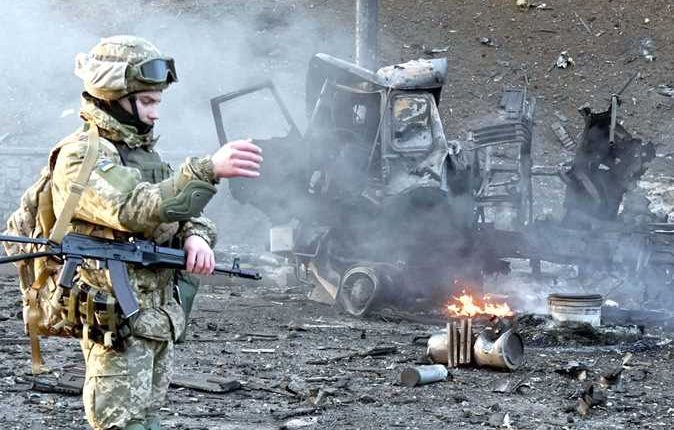THE COLLAPSE OF POLITICAL DOMINOES AND THE COLLAPSE OF THE EUROPEAN UNION

By General Monzer El Ayoubi
Translation: Pierre A. Sarkis

It seems that the expectations of Russian Prime Minister and Deputy Chairman of the National Security Council Dmitry Medvedev, which he did not spare on the media and the global Twitter platform about what we will see in the new year 2013, with some items ratified and others dropped, especially as concerns the collapse of the European Union. For in the heat of the of the special military operation of the Russian forces for almost ten months, which was transformed with the military and financial support to Ukraine, to an open war with the Western Alliance and NATO countries, even indirectly. The movement of some Serbian army units towards the border with Kosovo provoked international fear from sliding towards a new war on the European theater.
In its historical summary, the province of Kosovo is consideredthe Southern gateway to the State of Serbia, and the latter sees it as an extension of its strategic national security, and this geographical location has rendered it the scene of historical warsduring the last centuries, especially between the Ottoman armieson the one hand and the Serbian armies on the other, which led to the Ottoman Empire’s control of Serbia and the rest of the Balkan countries for about 500 years.
The ethnic, cultural and religious composition of Kosovo is a point of weakness rather than convergence and the majority of the population of 1.8 million people are ethnic Albanians, and the privileged geopolitical location has made it a target for Serbia’s ambitions with its constant attempts to annex the territory, with reference to Kosovo’s declaration of independence in 2008. Belgrade’s refused to recognize this, and it encouraged nearly 120,000 Serb minorities to challenge the authority of Pristina (Kosovo’s capital)- by inflaming tensions, especially in the Northern regions.
Subsequently, the renewed state of tension came on the 10th of December, 2022, after Serbian citizens blocked roads and provoked riots punctuated by armed attacks targeting police and international peacekeeping forces, in objection to the arrest of a former military officer involved in attacks against Kosovo police officers. This was followed by the announcement by the principal border regional authorities with Serbia, the closure of the main border crossing at Merdare, accusing the latter of seeking permanent destabilization and its tendency to ignite a new war under the pretext of protecting the Serb minority. In parallel, Belgrade put its forces on high alert while Serbian Army Commander General Milan Mojsilovic headed to the townof Raska, about 10 km from the common border to inspect the situation on the ground after the deployment of several military units in the troubled border area.
Respectively, remedies accelerated before the first shot wasfired, as Pristina asked NATO peacekeepers to remove barrierserected on its territory. Serbian Defense Minister Milos Vucevicstated in an interview on RTS: “We are all concerned about the situation and where its heading and Belgrade is ready to reachan agreement with Kosovo” without specific details, callingroadblocks a “democratic and peaceful” means of protest, revealing an “open line of communication” with Western diplomats to resolve the issue.
Conversely, the German Government called the increasedSerbian military presence on the border with Kosovo a “verybad sign.” European Foreign Ministry spokesman Christopher Berger called on the United States and the European Union to “defuse tensions.” A joint statement issued by the US State Department and the European Union included “calling on all parties to exercise maximum restraint and take immediate action to de-escalate without any conditions.” In London, the Chairman of the Foreign Affairs Committee in the British House of Commons, Alicia Kearns, warned of the seriousness of whatis happening demanding “more focus and effort on the events taking place in the Western Balkans, especially Kosovo, Bosnia and Herzegovina”, calling for calm and de-escalation.
On the other hand, while the West calls for calm, the fear of the flare-up of the geopolitical playing field exists at a new location, as Serbia is strategically an ally of Russia while Kosovo enjoysNATO protection. Kremlin spokesman Dimitry Peskov toldreporters “We support Belgrade in the steps it is taking- that Serbia is a sovereign state and it is fundamentally wrong to search for a destructive Russian influence there.” Peskov alsoconsidered that “it is natural for Serbia to defend the rights of Serbian citizens living in the neighborhood in extremely difficultconditions, and to respond decisively when their rights are violated.”
In astrology, “Medvedev” is not one of the palm and cup readers, his statements and expectations can be included at a minimum within the psychological warfare, but the facts of whatis happening on the land of the old continent does not exclude it, but rather impact it in the depth of its composition. After the end of World War II, it witnessed two pivotal events: the fall of the Berlin Wall and the unification of Germany, and the collapseof the Soviet Union and the scattering of countries East and West. Despite this, the European West and NATO maintainedthe strategy of classifying Russia as a major adversary and a first threat, which returned things in the chronological process to itsfirst course, where it spawned by the natural political logic and the historical, ideological and religious background, the return of the mother Orthodox Church to ring its bells in Moscow and disseminate its shadow on the religious and political realities, and the presence of a new leadership in the Kremlin of the quality of President Vladimir Putin and the ruling team to adopta strategy of restoring a Tsarist Great Russia that competes with the EU commercially and economically, excels militarily, as well as, consolidates with its capabilities and alliances, the rule of the planet by bipolarity.
In a chain reaction, figuratively, the collapse of European dominoes under the influence of geopolitical gravity is not unlikely, which means that bad events inevitably follow with consequences and repercussions. In light of the delicatesituation witnessed by the countries of the old continent, theirdemocratic systems and parties are successively tending to more radical governments, and the complex social crises resultingfrom the Russian-Ukrainian War is susceptible to deteriorationwith the multiple nationalities and ethnicities, which is the permanent point of weakness, in addition to the dilapidatedeconomic situation that portends the worst consequences:
– The victim of soaring prices, the French Government under the title of “Baguette Bread” is exerting pressure on gas and electricity suppliers to support bakery owners affected by risingprices.
– The London Telegraph Newspaper published today: “Povertyis at record level: there has not been a living crisis for Britonssince World War II as it is now, after inflation reached 9%. It is expected to reach 10%, the highest rate in more than 50 years.”
Local anesthesia reduces pain, so immediate situationaltreatments will not succeed in absorbing the resentment of the European peoples against the policies of their governments, especially after its involvement in supporting Ukraine financially at the expense of their well-being. In addition, open military support will not contribute to Russia’s defeat and time, and the open economic bleeding on the energy issue are not in Europe’s favor, in parallel with an almost global food crisis as a result of the low capacity to produce wheat and grains, and the difficulty or rationing of their export to developing and poorcountries.
Finally, Game Over is in place and humanity is at a criticalstage, as the elements of the conflict leading to total annihilation are in place, and the keys to the nuclear missile silos have been removed from rust; perhaps the age of the saints is bygone and the astrologers prevailed, but hope is synonymous with desire, and perhaps prayers, the median of all blessings, will still be effective.
Beirut, 06/01/2023
Scholar in Security and Strategic Affairs

